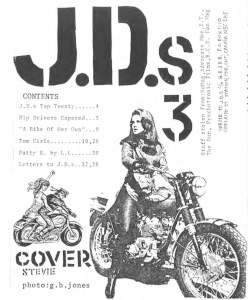Queercore is a cultural/social movement that began in the mid-1980s as an offshoot of the punk subculture and a music genre that comes from punk rock. It is distinguished by its discontent with society in general, and specifically society's disapproval of the LGBT community. Queercore expresses itself in a DIY style through magazines, music, writing and film.

The Hidden Cameras are a Canadian indie pop band. Fronted by singer-songwriter Joel Gibb, the band consists of a varying roster of musicians who play what Gibb once described as "gay church folk music". Their live performances have been elaborate, high-energy shows, featuring go-go dancers in balaclavas, a choir, and a string section.

Joel W. Gibb is a Berlin-based Canadian artist and singer-songwriter who leads the "gay church folk" group The Hidden Cameras. He was born in Kincardine, Ontario.

Bruce LaBruce is a Canadian artist, writer, filmmaker, photographer, and underground director based in Toronto.
Fifth Column was a Canadian all-female post-punk band from Toronto, formed in 1980 and breaking up in 1995.
Scott Treleaven is a Canadian artist whose work employs a variety of media including painting, collage, film, video, drawing, photography and installation.

J.D.s was a Canadian queer punk zine which started in 1985 and ran for eight issues until 1991. The zine was co-authored by G.B Jones and Bruce LaBruce and is credited as being one of the first and most influential queer zines. The zine's content was centred around anarchic queer-punk themes and heavily discussed queer-skewed punk music from the late 1980s.
Caroline Azar is a director and playwright. She was the lead singer, keyboardist and co-lyricist/composer of the band Fifth Column.

No Skin Off My Ass is a 1991 comedy-drama film by Bruce LaBruce.
Leslie Mah is an American musician and performer.
Daniel "Deke" Frontino Elash is an American zine editor, musician, actor, activist and historian.

36C is the third studio album by the Canadian post-punk band Fifth Column, released in 1994 by K Records. The album cover features a photo of Jena von Brücker in a scene from the film The Yo-Yo Gang. The song "All Women Are Bitches" has been covered and sampled by Lesbians on Ecstasy as "Bitschy" in 2004 and by Kids on TV in 2005.
A no-budget film is a film made with very little or no money. Actors and technicians are often employed in these films without remuneration. A no-budget film is typically made at the beginning of a filmmaker's career, with the intention of either exploring creative ideas, testing their filmmaking abilities, or for use as a professional "calling card" when seeking creative employment. No-budget films are commonly submitted to film festivals, the intention being to raise widespread interest in the film.

Rachel Carns is an American musician, composer, artist and performer living in Olympia, Washington, U.S. Raised in small-town Wisconsin, she went on to study painting and drawing at Cooper Union for the Advancement of Science and Art in New York City, where she completed her B.F.A. in 1991. Carns began her career as drummer for Kicking Giant, later collaborating with several bands, including The Need. She is a celebrated graphic designer, working under the name System Lux, and plays drums and percussion with experimental performance art group Cloud Eye Control.
Lucy Thane is a British documentary filmmaker, event producer and performer, living in Folkestone. Her films include It Changed My Life: Bikini Kill in the UK (1993) and She's Real (1997).
Marcus Ewert, previously known as Mark Ewert, is an American writer, actor and director, living in San Francisco.
The Images Festival is a yearly event devoted to independent and experimental film, video art, new media and media installation that takes place each spring in Toronto.
G. B. Jones is a Canadian artist, filmmaker, musician, and publisher of zines. She is best known for producing the queer punk zine J.D.s and her Tom Girls drawings.

The Metro Theatre was an adult movie theatre in Toronto, Ontario, Canada. Located at 677 Bloor Street, it was open ten hours a day throughout the entire week before its closure in 2013. Built in 1938, it is one of the several Art Deco theatres built in Toronto in the 1930s by architects Kaplan and Sprachman. Metro Theatre opened in 1939 as a neighbourhood theatre showing second run films and B movies and in 1976 started to show adult films. The theatre is stylized for the 1940s, one of its screening rooms had 286 seats and another 320, there is also a snack bar. The entrance contained signed photos of notable pornographic stars, including Ron Jeremy.
It is Not the Pornographer That is Perverse... is a 2018 English and German language collection of four gay pornographic short films directed by Bruce LaBruce for CockyBoys studio. The title refers to Rosa von Praunheim's film It Is Not the Homosexual Who Is Perverse, But the Society in Which He Lives (1971).







